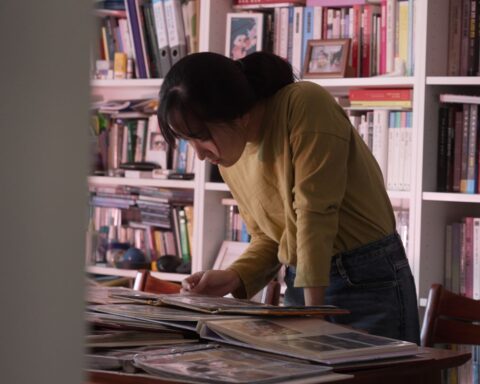Les heures heureuses (Our Lucky Hours)
(France/Belgium/Switzerland, 77 min.)
Dir. Martine Deyres
Les heures heureuses is a time capsule that uses recently uncovered home videos to provide a stark if repetitive look over decades at the Saint-Alban hospital in the Lozère region of France. South of Paris, north of Marseille, the mountainous and secluded area has been like an island of seclusion for generations. It’s separated from cosmopolitan areas with residents living the bucolic life expected from such an environment. In the rolling hills and pastures, an asylum was built to house the mentally ill, and by the 1930s, it had become a house of horrors where the patients were treated like the cattle that shared their accommodations.
After the arrival of several doctors who mixed their left wing politics with a humanistic mission, they helped change the treatment of these patients by literally freeing them from restraints. Gone were the straightjackets and iron bars, replaced with art therapies and trips to the countryside to engage in horticulture as a form of healing. What was once akin to a prison shifted towards a completely different philosophy driven by such heady philosophical underpinnings as surrealism, communism, and other waves of thinking that occupied much of 20th century France.
The grainy videos, buttressed by the addition of post-production Foley sound to give them more life, afford insight into the quotidian behaviour of both patients and caregivers. Traditional divides between those in charge and those under care were being softened. Throughout the film, we see troubled people engaged and encouraged rather than restrained and rebuked. With dry and distant narration, we are told about the various people that come and go, about the experiments in care that would flourish during this period, providing both a wistful commentary about the actions of the institution.
As the film drifts along, we’re treated to images from some of the patients – the “Art Brut” fascination that craved the expression of so-called “outsiders” and fetishized their inhibitions and experiments. Told in roughly chronological order, Deyres’ film unfolds with a gentle pace, where things change very slowly and each decade blends into the others.
Certain events are given more prominence, including stories about how Jews were sheltered at the hospital during the war with false papers indicating madness in order to provide sanctuary. This is a fascinating element of the tale, of course, but equally there’s little in the way of footage to tie this to the rest of the film visually.
Besides the narration, there are testimonies from various staff members about their time at Saint-Alban. Once again, there’s a kind of gauzy recollection to what transpired, with positive memories and a wistfulness echoed by the grainy footage. It further emphasises the sense that we’re being treated to something that feels entirely insular, like watching vacation footage from someone you’ve never met. For some, this glimpse into the past will be fascinating, while for many the repetition will become increasingly tedious.
In the end, Les heures heureuses provides a unique glimpse into a specific time and place. It’s easy to see how a truncated version would do much of the heavy lifting, and there’s certainly an occasional sense of indulgence as we’re watching events unfold without much in the way to draw audiences in. That said, many will be attracted to these ghosts of the past, and may find themselves drawn into the lives of these individuals. Either way, the film does what it sets out to do, providing context for this previously lost footage, and shedding light on this forgotten place.
Les heures heureuses screens at Toronto’s Rendezvous with Madness Festival through Oct. 22.











